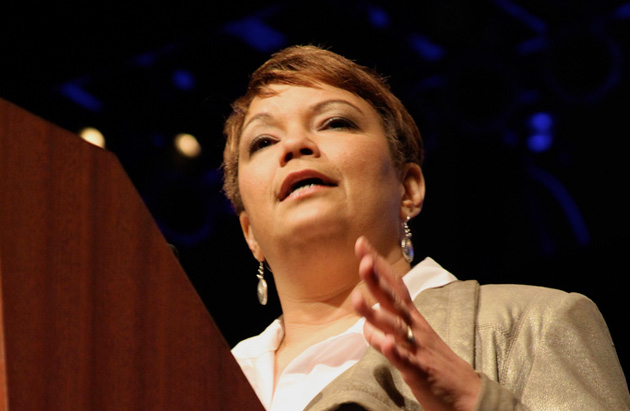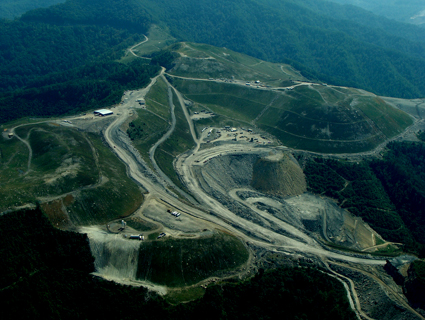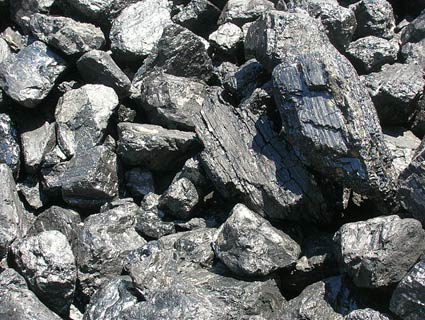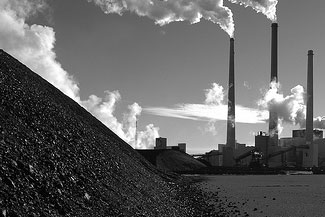
EPA Administrator Lisa Jackson.<a href="http://www.flickr.com/photos/lmdo/5628985782/">Linh Do</a>/Flickr
This story first appeared at Grist and is reproduced here as part of the Climate Desk collaboration.
It’s been a bumpy road for Lisa Jackson through three and a half years as chief administrator of the Environmental Protection Agency (EPA). But the 50-year-old chemical engineer doesn’t look fazed or fed up. A scientist-turned-insider who has learned that the levers of power don’t always budge without a fight, she shows a little steel in her eyes as she ticks off achievements and notes setbacks. But she also lets mischief color her laugh as she acknowledges what she calls the “toxic attitude of absolute certainty” that paralyzes progress on climate and other issues.
In 2009, President Obama appointed Jackson to lead the EPA, the agency she’d worked at for 16 years before serving in New Jersey’s environmental agency, where she became commissioner in 2006. Jackson took the EPA helm at a moment of high hopes for green advocates in the United States. They’d spent eight years in George Bush’s wilderness; now they felt they were on the verge of passing climate legislation at home and a global carbon accord at the Copenhagen talks.
What could go wrong? Only everything.
Today progress on climate at the federal level seems less likely than ever. Certainly, Jackson can point to a passel of signal achievements: She has reinvigorated the agency, presided over a plan to double automobile fuel-efficiency standards over the next decade, established EPA’s right to regulate greenhouse gases like carbon dioxide as pollutants, and placed new controls on mercury and other toxic power plant emissions.
But Jackson has also watched as the faltering economy and a partisan civil war in Congress have placed environmental issues on a low-simmering back burner—and placed EPA itself in the crosshairs of an increasingly radical conservative movement that aims to defang, defund, and ultimately destroy it. Even if it dodges that bullet, her EPA must use the narrow statutory authority of a handful of increasingly outdated laws to tackle an endlessly multiplying set of problems. Meanwhile, new laws are out of reach, and old-fashioned regulations get held hostage to competing agendas: Her agency’s proposal to tighten ozone standards met sudden death at the hands of the White House that had appointed her.
Jackson has stuck to her post, despite rumors that she might resign in the wake of that ozone reversal. At the end of last week, she visited Seattle to drop in on Boeing, speak at the annual Climate Solutions breakfast, and deliver a commencement address at the University of Washington. She also took time to talk informally at an event with Grist supporters, and sat down with us for an interview.
We knew there was little chance that Jackson would go off message or make unscripted news, and we weren’t going to play gotcha with her. But we did get some intriguing glimpses of the mind of the woman who’s still trying to push the Obama administration’s hope wagon over all those bumps.
Q. Right now US fossil fuel production is ramping up, and a lot of people are enthusiastic about energy independence and jobs in that industry. So national security and employment are set up to be at odds with the environment. Can we get beyond that?
A. First of all there’s two sides of the energy discussion: There’s production, and there’s also use. America as a consumer-oriented country is seeing real choices for the first time in using less energy. That’s very good for the American pocketbook. There’s simply no reason why American cars can’t be efficient and still be cool and be a part of what drives our economy. And if you want proof of that, look at what’s happening right now in Detroit. I have conversations all the time with young people, and they’re not feeling like they’re losing anything by the fact that they’ll be able to have choices and much more fuel-efficient cars should they choose to buy them.
The president talks about “all of the above” energy, and I think we don’t realize enough how important that is. There are those who would like us to drop everything and say, time for another, a second fossil fuel boom, and the president is saying, but the future for our country is around clean energy, renewables, and getting that technology perfected and ready at a commercial scale here so we can sell it abroad. That will make our country stronger and create jobs as well. We should not put all our eggs in any one basket. And we should not, just because we have it, assume that means we should use fuels as though we have it—because energy independence requires a certain reduced demand. We saw reduction in demand for gasoline, refined oil, this year, and part of the reason is that Americans have a choice to buy cars and trucks that use less of it. And that’s good for our economy. So the money can go somewhere else.
Q. So when people who are passionate about the environment hear “all of the above,” they’ll think of the list of things in “all of the above,” and one of them’s going to be coal. Is that part of the definition of “all of the above?”
A. What we’ve done at EPA, because we’ve had to from court order, and it’s long overdue in my opinion, is deal with pollution from coal-fired power plants. Pollution from coal-fired power plants comes from the extraction of the coal in some cases, the burning of the coal, which gives soot and smog-forming pollution, and mercury and lead and arsenic and cadmium and acid gases and then you’ve got to get rid of the ash!…One form of energy has to at least be subject to the same laws as the other forms are. That’s what we’ve been working on as far as coal. I always tell people, it’s not about coal, it’s about the pollution that for too long has been associated with coal.
And then coal has another pollution problem, and that’s carbon pollution: It’s the most carbon-intense fossil fuel. And the president invested in carbon capture and sequestration technology as part of the Recovery Act. He said all along, I’m from a coal state, so I believe that if there’s going to be a future for coal it has to be one that deals with carbon pollution, with climate change. So in my opinion the problem for coal right now is entirely economic. The natural gas that this country has and is continuing to develop is cheaper right now on average. And so people who are making investment decisions are not unmindful of that—how could you expect them to be? It just happens that at the same time, these rules are coming in place that make it clear that you cannot continue to operate a 30-, 40-, or 50-year-old plant and not control the pollution that comes with it.
Q. You’re a career scientist, and public dialogue in this debate today sometimes seems to have moved completely away from science and facts. People are talking about how we live in a post-fact society. What can we do about that? Do you think that’s accurate? What do we do about it, and what can scientists do to speak more effectively and get facts back into the mix?
A. All scientists should in my opinion take heed of the importance of the peer review process. Inside the Washington Beltway is very different than outside. Inside the Washington Beltway, I’m not sure whether facts always matter, and that’s a sad thing for our country. But oftentimes EPA’s work is peer-reviewed and then peer-reviewed again—and yet it will be challenged by some report that hasn’t been peer-reviewed at all. There needs to be equivalence there—inside, for policymakers. That would be one thing I’d ask. More and more when people pull up some, um, interesting report, my first question is, who reviewed it? Where is the peer review? Because you would never allow me to submit something that wasn’t peer-reviewed. And I think that’s fair, and I think on both sides it should be that way—on the EPA side, or the government side, the public-sector side, and on those who might challenge it.
The second thing I’d say is that the American people, when given an opportunity to sit down and understand what’s going on, are very, very reasonable. The battle today is about who can get the screaming headline out first. Because, unfortunately, the way the media works, the screaming headline lives forever, and then you spend forever trying to get a headline even half as big that says, oh, that wasn’t true. So whether it’s climate change and the myriad reports about that, whether it’s people in rural America who’ve been told all manner of untruths about the work we’re doing—whether it’s that we’re going to regulate farm dust further, or that we’re going to regulate spilled milk, no matter how many times we say it, because their main sources of information are not really being truthful in how they’re giving them information, we spend an awful lot of time trying to explain to people what we’re really doing. And it’s not just on the environmental front, but that’s emblematic of how folks have learned to use this new media world.
Q. This [at the Climate Solutions Breakfast] was a primarily white audience. You’ve brought a more inclusive air to the EPA. How do we get these issues out there so that all of America is on board and acting, and environmentalism is not just a province of the privileged?
A. It’s a very good point. We cannot have clean energy or health issues be the province of the privileged, right? Because what happens is that those who are lower on the economic rungs feel as though this is something else that is being done to them. Everywhere I go we try to meet with communities of color, we meet with young advocates, and they totally believe that this is an important moment for their health, and for the future of our planet, when it comes to climate change. We need more partnerships that bridge that gap. There are wonderful groups at the community grassroots level; we don’t need to invent any more. We need to find them and link them up with partnerships.
I heard a wonderful story—it’s told by a guy from the Turkey Creek Watershed group in Mississippi. They are a small African American/Native American group of residents who live in this community, and they were concerned about a new highway that was going to come through yet again—wasn’t the first one—to another part of their community. And they have been dealing with the state of Mississippi on it. And he tells a funny story about how here they are working, and working, and trying to get traction about the injustice of them having to have all of this runoff. Basically, they love to fish, it’s a watershed where they do a lot of fishing. And they really didn’t start to get traction until they worked with one of the traditional groups who helped them see that not only is this a watershed, but it’s a really important flyway for migratory birds. It brought a lens to their issues at the national level, but it also brought national issues to them. It was a two-way street. So those partnerships are really important. We shouldn’t be afraid of them. We should be finding them…
There are groups out there who care. They may speak literally a different language, or they may see their issues in a different way. But there’s a willingness to sit down at the table and say, okay, how can we make this all work? And it’s happening in communities out here, around the country. California’s doing it; New York; Chicago. We’re finding ways.
In Chicago, here’s Mayor [Rahm] Emanuel saying, how about we put some boathouses on the Chicago River? And all of a sudden communities that have lived on that river their whole life and turned their back to it, go, wait a second, we can have the kind of amenity that people on the Magnificent Mile have downtown. It changes the conversation. It’s all about finding a way to combine the issues. Nothing wrong with that. You’re not cheating if the issues, just like climate, happen to have many problems with one really cool solution.
Q. If you were writing a headline for your work on the climate issue at EPA, up to now, or for whenever your work is done at EPA, what would you want it to be?
A. “In accordance with the law, we moved forward with sensible, cost-effective steps at the federal level on climate, using the Clean Air Act.” And I would have a second sentence—see, I can’t write headlines! But it would be something like, “The progress at state and local levels, combined with the federal level, does not obviate the need”—you can’t use obviate, it’s above fifth-grade level!—”does not obviate the need for federal legislation to address this incredibly important challenge for this and future generations.”














